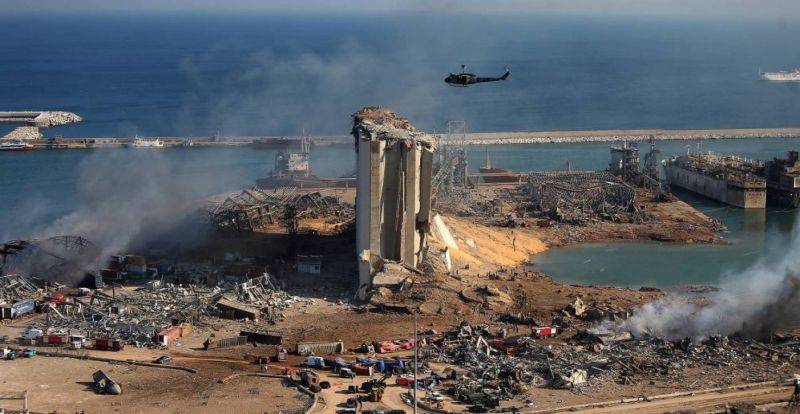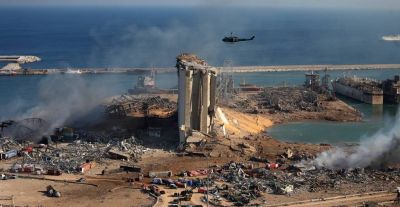
The Beirut port after the Aug. 4, 2020 explosion (Credit: AFP file)
BEIRUT — The president of the Higher Judicial Council (HJC) Souheil Abboud last week appointed Judge Jean-Marc Oueiss, a member of one of the chambers at the Court of Cassation, to rule on the request to dismiss the investigating judge at the Court of Justice Tarek Bitar.
The request to dismiss Bitar, who is the lead investigating judge on the Aug. 4, 2020 port blast probe, was submitted in December by Ghazi Zeaiter and Ali Hassan Khalil, MPs close to Parliament Speaker Nabih Berri and who have been implicated in the case.
The examination of such recusal requests is normally part of the jurisdiction of the first civil chamber of the Court of Cassation, which is chaired by Naji Eid. Yet, in a seemingly obstructionist attempt to delay the investigation led by Judge Bitar, Zeaiter and Khalil followed up their request with a lawsuit against the state alleging “serious fault” by judge Bitar before the plenary session of the Court of Cassation in February. This is all while this court had lost its quorum a month earlier due to the retirement of several of its members.
Hence, since February, Judge Eid has not been able to consider the dismissal request targeting judge Bitar, waiting indefinitely for the plenary assembly to resume its work and decide his own fate. Almost two weeks ago, he finally decided to withdraw himself from the case.
The law allows a judge to recuse themself from a case when it makes them feel “embarrassed.”
L’Orient-Le Jour was not able to find out the reason behind this apparent feeling of embarrassment, as the judge was not obliged to inform higher authorities about it. HJC’s president Abboud, to whom recusal application was submitted, immediately transferred it to one of the Court of Cassation’s chambers, which accepted it.
It was only after Eid’s withdrawal was approved earlier this month that Abboud appointed Oueiss to head the first chamber of the court (also composed of two judges) to examine the recusal requests targeting Bitar.
This new development comes in the context of a legal tug of war. One one side are the officials involved in the port blast investigation and the ruling class that seeks to protect them, while on the other is Judge Bitar, who can no longer carry on with the probe because of the multiple recusal requests filed against him by these officials, as well as the HJC’s head Souheil Abboud, who is clearly keen on contributing to the pursuit of justice.
Undoing a link
In judicial circles, the appointment of Judge Oueiss has been perceived as a desire by Judge Abboud to advance the investigation that began three years ago, while the political authorities have been trying to freeze it by appointing an alternate judge who would be in charge of deciding on the release of detainees in the case.
“The appointment of an alternate judge would be a way to remove Tarek Bitar from the case, while the appointment of a judge able to examine the recusal requests against him is a way to undo a link in a tangled chain that prevents him from moving forward in the case,” a higher-level judge told L’Orient-Le Jour on condition of anonymity, as he was not authorized to speak to the press.
The first chamber still needs to reject the recusal requests presented by Zeaiter and Khalil against Judge Bitar. Even if this happens, Bitar will not be able to resume his probe, because a similar request before the third chamber of the Court of Cassation, chaired by Suheir Harake, also needs to be examined. It is the request presented in June by the former Customs Director Badri Daher, who is currently detained in connection with the port blast. Once these two recusal requests are examined, Bitar will see his hands untied.
But facing the risk of any new recusal requests, Bitar may have to speed up the investigation, including the collection of new proof or evidence that he may reach since investigation was suspended in December by the requests of Zeaiter and Khalil.
Bitar nevertheless remains targeted by a lawsuit against the state alleging “serious fault” against him, which former Public Works and Transport ministers Youssef Fenianos, who is also implicated in the case, filed in December, as well as a similar one filed in February by Daher, a separate lawsuit from the one in June.
As a result, Bitar’s next move will consist of enriching his database. He will neither be able to examine the issues related to Fenianos and to Daher, nor will he be able to issue an indictment, unless the plenary assembly, which is the only one authorized to decide on “serious faults” allegations, is formed.
It will therefore be a long time before Bitar’s struggle ends.
This article was originally published in French in L’Orient-Le Jour. Translation by Joelle El Khoury.


